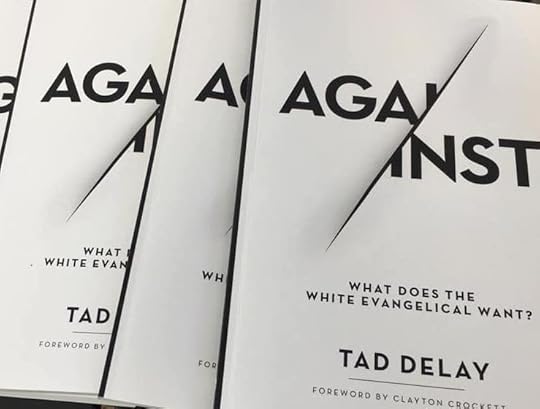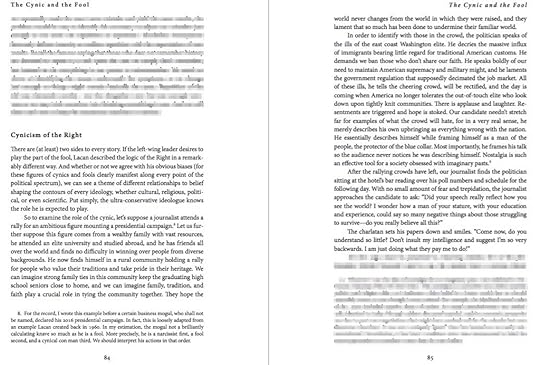Tad DeLay's Blog
August 19, 2019
Available Now | Against: What Does the White Evangelical Want?

First, thanks to everyone who has already shared the book and podcast via social media or word-of-mouth. I rely on friends to get the word out, and seeing the interest in this book has meant a lot.
GET THE BOOK: Against: What Does the White Evangelical Want? is available now! It will be out for e-readers within two weeks. If you’d like to avoid giving Bezos more money, you can ask any bookstore to place a special order for any book, and they will be happy to do so. You can also order directly from my publisher Cascade, which is running a discount. Barnes & Noble has a fair price as well.
SAMPLE CHAPTER: In this excerpt from Against Knowledge, I explore connections between the anti-choice movement, private schools, creationism, and white supremacy.
PODCAST: Instead of an audiobook, I've launched a 10-part podcast based on Against. Also avaialable on Spotify and Google Play—just search "Tad DeLay". Not everyone has the time or money for books, so this gets the research out for free.
BACK COVER: “Against traces five zones of opposition: future, knowledge, sexuality, reality, and society. If climate change is the greatest threat civilization has ever faced, then a faith aiding collapse must face analysis. If it swims in assured forgiveness, it feels no shame for its sins against humanity. If it wants a king, it threatens democracy. If it veils xenophobia, it shall be ever more cruel. In a critical and accessible history of odd ideas, DeLay chronicles the past and sketches its troubling future. It might die, but what’s certain is that a faith built on nostalgia and supremacy won’t moderate. We live in dangerous times, so let us consider its justifications, turmoil, appetite, and catastrophe.”
SUPPORT: Just a reminder that anyone supporting me at the books tier gets all of my books. I'll be mailing them out this week.
KEEP UP WITH ME: Subscribe to my very-infrequent newletter, or connect on Facebook, Twitter, or GoodReads.
INTERVIEW: My recent interview on The Magnificast explores my background with white evangelicalism, the shame/anxiety/indifference relationship, and the evangelical-capitalist resonance machine. It's a good overview of the project.
_____________________________________________________
FROM THE FOREWORD:
"DeLay is the most effective and accomplished theorist of the critical intersection of psychoanalysis and conservative Christian politics...This is most apparent in this book, which asks: what do white evangelicals want? The short answer is that they want to destroy us, if us includes anyone who is invested in human flourishing and sustainable life on our planet."
—CLAYTON CROCKETT, University of Central Arkansas
ENDORSEMENTS:
“In this tour de force, Tad DeLay refuses to mince words as he exposes con- temporary white evangelicalism for what it’s become: faith in white supremacy, misogyny, and heteronormativity masquerading as faith in Christ. By pull- ing back this curtain, he shows us that what is commonly confused for white evangelical hypocrisy is actually perfectly consistent with the white evangelical desire for domination and destruction. This book is a must read for all those who wish to better understand the hidden motivations of contemporary white evangelicals, as well as those who recognize the urgent responsibility of resist- ing what white evangelicalism has become in this day and age.”
—PHIL SNIDER, Editor of Preaching as Resistance and Justice Calls
“Tad DeLay’s remarkable Against represents a pathbreaking psychoanalysis of the evangelical movement. Each page has an arresting new insight into the structure of the evangelical appeal and the damage that it’s doing. In lucid prose, DeLay lays out the case for why we need psychoanalysis to understand the recalcitrance of evangelicals when confronted with obvious facts. Rather than condescending to them or parroting the liberal line about the need for more education, DeLay’s book articulates the immense enjoyment that derives from the evangelical denial of common sense—including, most importantly, the burning up of the planet. It is an urgent plea for recognition of a problem that threatens everyone’s survival and is simply a must-read for anyone con- cerned about where things are headed.”
—TODD MCGOWAN, University of Vermont
“People wonder why secularism has not yet domesticated American Evangeli- cals. They wonder why ‘pro-life’ people cannot see the climate crisis as life-ne- gating. They wonder why godly people support Donald Trump. Such persons should read Tad DeLay’s vital book, and temper their fantasies about reason. Today’s threatening mode of reason is a powerful ‘resonance machine’ positing the perpetual absence of absolute self-sovereignty as an injunction to punish. We are, DeLay argues, being punished into apocalypse.”
—PAUL JOHNSON. University of Pittsburgh
November 3, 2018
August 25, 2018
Find me on Patreon
If you desire to financially support my work, consider joining me on Patreon.
“I wish my philosophy class could have been more like this.” It’s the most encouraging line I hear after talks or when meeting readers. Philosophy should be open to anyone and not limited by the amount of time to spare in traditional learning environments. That’s why I write books on both academic and more accessible tracks. This space is another venue toward the goal of opening up theory to the public.
Patreon is a way for me to create flexibility. Teaching in the university classroom is an important part of my vocation, but it has limits. While I continue to research, write books, and teach, I will be developing online courses around the intersections of theology, psychoanalysis, critical theory, and political philosophy—fields with too little space in the modern university context. I'll be developing 2-3 courses per year as well as stand-alone talks. I want to create a space for people to learn at their own pace.
July 12, 2018
Speaking Events
I’m headed to New Jersey to talk about my work for a couple of evenings this weekend. The events run 7-9pm on Friday July 13 and Saturday July 14.
St. Mark's Episcopal Church
140 South Finley Avenue
Basking Ridge NJ 07920
Tickets on Eventbrite
April 29, 2018
Talk from Deconstructionists Podcast Live in Denver
I enjoyed taking part in the this event hosted by Adam and John in Denver. Find more about them here. The audio is poor quality, and we have my iPhone to thank for that, but here it is.
December 9, 2017
How many Americans believe the world will end?
The decision to move the U.S. embassy to Jerusalem comes during a week during which I’m researching for a chapter in my next book examining how apocalypticism underwrites climate denial and war. Two big problems: (1) we don’t closely track how many Americans believe the world will end son (we really should keep better data on this!), and (2) this type of belief is a background ideological state that doesn’t necessarily influence policy opinions. But here are a few of the numbers we have:
(TL;DR version: somewhere between a fifth a little over a third of Americans don't expect a 22nd century)
In a 2010 Pew survey survey, 41% of Americans believed Christ will return in the next four decades (definitely 23%, probably 18%). 48% of all American Christians, 58% of white Evangelicals, 32% of Catholics, and 54% of all Protestants believed Christ will definitely or probably return in four decades, as did 59% of those with no college experience (compared to 19% of college graduates). Among all U.S. Christians, only 10% said Christ will definitely not return in the next four decades.
In a 2011 Pew global survey of Evangelical leaders, 54% of Evangelical leaders believed Christ will definitely/probably return in their lifetimes, and 61% believed in the Rapture. 67% of Global South leaders and 34% of Global North leaders believed Christ would return in their lifetime.
In a 2006 Pew survey, 79% of American Christians believed Christ would return to earth someday. Among those who believed this, 25% of Christians said this would happen in their lifetime, and 49% said it would not. Also among those who believe Christ will return, 43% expect the world situation to worsen before Christ arrives.
In a 2012 Ipsos poll, 14% of people worldwide and 22% of Americans believed the world will end in their lifetime.
In a 2012 PRRI survey, 36% of Americans (65% of white Evangelicals, 21% Catholics) believed natural disasters are evidence that we are living in the end times.
In a 2013 OmniPollSM survey, 41% (54% of Protestants, 77% of Evangelicals) believed we are living in the Biblical end times. (Caveat: this was conducted for a client who owns the original research, so I haven’t verified the methodology and data, but that 77% number would be huge if we could verify).
In a 2016 Lifeway survey of Protestant pastors, only 25% say the rapture is not a literal event. Pastors with master’s or doctoral degrees were four times as likely to reject the rapture as a literal event. Only 6% of pastors with no college degree and 16% of pastors with a bachelor’s degree rejected the idea of a literal rapture.
In a 2013 Lifeway poll, 18% of Americans believed the world would end in their lifetime, while 70% disagreed. By income, 30% of those in household making under $25,000 believed the world would end in their lifetime, while only 9% of those in households over $75,000 agreed. 24% of Americans 18-29 years believed the world would end in their lifetime, as did 15% of people over 65.
In a 2015 Brookings Institution survey, only 5% of American Christians and 12% of Evangelicals believed Christ would return in their lifetimes, but 79% of Evangelicals believed "that the unfolding violence across the Middle East is a sign that the end times are nearer.”
In the current data from Yale Climate Communications, 69% of Americans believe global warming is happening, 52% believe it is caused by humans, and only 48% believe scientists agree that global warming is happening.
In a 2017 CNN tracking poll, 70% agree global warming is happening, and 55% agree that it is caused by humans.
In a 2017 Pew survey, 74% of Americans agree the earth is warming (92% of Democrats, 52% of Republicans). 78% of Democrats and 24% of Republicans believe global warming is caused by humans. 21% of Republicans say there is no evidence for global warming because it just is not happening, and 22% of Republicans say there is no solid evidence to know whether the earth is warming.
If you have additional data on apocalyptic belief in the U.S., I want it!
November 25, 2017
The Next Book
For the last year, I’ve been thinking on and off again about what to do with my dissertation on Christianity and populism. The dissertation itself would not make an excellent book as it is, so my options have been either to heavily revise it or else set it aside and pull it’s theoretical content into an entirely different format. For the last week, I’ve finally committed myself to the latter option.
Everywhere I go—in private conversations, at public talks, and all throughout the classes I teach—I find myself fielding the same questions on the perplexing “Why?” of Trumpism and white Evangelicalism. To every question like “Why don’t they understand the facts of X,Y, and Z?” I bring statistics, theory, and personal experience to explore the desire underwriting the (apparent) insanity, which is internally coherent. I want to say, for instance, that to fully understand why parents abuse their children with conversion therapy, you also want to understand how and why Evangelicals enjoy prohibitions on masturbation or sex outside of marriage; you can’t understand climate science denial unless you grasp just how many fellow citizens expect the world to end very soon; you can’t understand the attack on public education unless you know the early links between the rise of private schools and desire to re-segregate; you can’t understand the appeal of the obvious propaganda on Fox News unless you understand the decades spent curating a victim complex. I want a book that takes a perplexing topic and, by the end of the chapter, gives the reader the sense that they fully understand how that desire works.
I want this book to feel like a departure from my prior work in it’s style and content. I read Corey Robin’s The Reactionary Mind this year, which was a really brilliant and accessible history of conservative thought. Ever since, I’ve imagined taking a similarly clear approach to explaining the conservative religious mind. I want to take my first-hand experience and cross it with my theoretical influences to describe the mind that is at once hostile and submissive, assertive and revanchist, pious and nihilist. I want to write a book not on Evangelicalism and Trumpism per se, but instead I want to describe the disposition that blurs the lines between the two: the counterintuitive enjoyment derived from submission, repression, and aggression.
Rather than the theoretically-heavy nature of my prior work, I want this book to be full of original research and reporting, history, statistics, and stories that lend a sense of understanding what these movements desire. My double-full-time teaching schedule will mean this project is written over months instead of weeks, but during the last week I’ve written about 10% of a rough draft (breaks are, after all, a chance for extra work). This is my working title and chapter outline.
Turmoil & Resonance: The Analysis of Populism, Evangelicalism, and Submission
Introduction: Shame, Aggressiveness, and Turmoil
(1) Against Sexuality: Sadism in Purity Culture, Gender Roles, and Repressive Heteronormativity
(2) Against Knowledge: The Rise of Alternative Education, Re-segregation, Assaults on Public Education, and the Erasure of Critical Thought
(3) Against Society: Global Crises of Nationalism, Whiteness and Anti-blackness in Trumpism, and Myths of Working Class Anxiety
(4) Against Self: The Desire for Lower Wages, Fewer Resources, and the Deprivation of Healthcare
(5) Against Future: Apocalypticism, Climate Denial, and Wall Street Resonances
(6) Against Reality: Traditional and Social Media, Propaganda and Fairness, and the Enjoyment of the Victim Complex
Counter-pressure: Lessons from Activists and Educators Disrupting Resonance
November 7, 2017
New Interview at CRI
In preparation for my upcoming book event on Nov. 9th with CRI, Carl Raschke has posted an interview with me about why I wrote The Cynic & the Fool. I discuss why I wrote the book and how odd it feels to have written a book in 2015 that seems to be about everything happening in 2017.
I think I have some great tangents about how pictures of Luther were once used as preventative fire insurance magic back in the 16th century, and I discuss writing as an older millennial today along with the sense of low-grade intergenerational economic conflict wrapped up in the millennial experience today.
October 27, 2017
Excerpt from The Cynic and the Fool
While preparing for my upcoming event (Denver, November 9th) on The Cynic & the Fool, I came across this section. I even added a footnote just before publishing in order to clarify the timeline. It reads like such a transparent and uncreative allusion to a certain somebody, who declared his candidacy a day after I finished the book’s rough draft, but I was just trying to think through all of the most absurd things a conservative politician in the US could get away with pretending to believe.

June 29, 2017
New Interview at The Catacombic Machine
This is my first new interview since releasing The Cynic & the Fool. Find it at The Catacombic Machine or listen to the podcast on iTunes.
Josef Gustafsson and I talk about why I wanted to follow God Is Unconscious by writing a more accessible book, and I explain just how much the timing of this book surprised me given the right-wing populist turmoil which came to life a single day after I finished my first draft. We discuss the Deleuzian desiring machine, the war of affects and religion, and the current political crisis.




